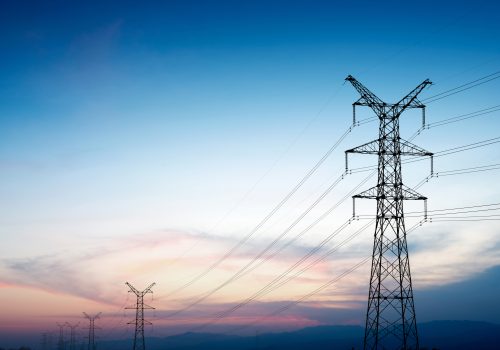For the Biden administration, it has been the best of times and the worst of times. On the one hand, the administration has delivered two of the most transformative legislative achievements on energy and climate in decades—the bipartisan Infrastructure Investment and Jobs Act (IIJA) and the Democrat-led Inflation Reduction Act (IRA) which represented over $300 billion in energy, climate and decarbonization expenditure. But the rapid post-pandemic recovery of energy demand and the illegal Russian war of aggression in Ukraine have also triggered the biggest global energy crisis since 1973, sending global energy prices soaring and accelerating inflationary pressure across the globe. The geopolitical ripples of the Russian invasion mean that highly volatile and unpredictable market developments will persist for months, if not years.
The 2022 midterm elections thus come at a critical point and raise key questions for the Biden administration. What impacts, if any, will the midterms outcomes have on the administration’s ability to implement its landmark laws? What ideas will Republicans, with divergent views on the United States as an energy superpower and its climate leadership role, bring to the legislative table? Perhaps most crucially, can a divided government come together on outstanding opportunities and challenges in domestic and international energy policy?
The makeup of Congress is one piece of a multifaceted puzzle around US energy and climate governance, and the midterm results must be understood in that context. Three possible electoral outcomes are detailed below.
Scenario 1: Democrats retain united control
If Democrats manage to overturn the historical pattern of midterm cycles for a new presidency, united control of Congress would give the Biden administration significant breathing room to run its domestic and foreign policy energy agenda with minimal congressional interference.
But this scenario does not necessarily mean that new climate legislation is imminent. Crucially, the Biden administration achieved its key goals on this front through the IIJA and the IRA already. While tweaks to the latter may theoretically be possible with unified control of Congress (especially in light of the chorus of international opposition to some of the IRA’s on-shoring and “friend-shoring” provisions), the White House is not under political pressure to pass another major climate bill. A litany of other important issue areas—healthcare, reproductive rights, gun control and more—are highly motivating to the Democratic base and would thus be next on the agenda (though the minority GOP will be in no mood to assist with passing legislation via regular order).
The key benefit of unified control where it concerns energy and climate is what it would avoid—specifically, the prospect of intra-congressional disputes and brinksmanship over must-pass pieces of legislation (such as omnibus packages and government funding). Unified control would keep arguments over controversial inclusions in said bills among friends. While GOP leadership might rail against legislation or new executive actions from the sidelines, they would lack the ability to meaningfully obstruct policies they disagree with until 2024. This is especially true of the Senate, where the GOP would not have the numbers to prevent the confirmation of the president’s executive appointments—or any new Supreme Court justices. The latter, in particular, could have important long-term implications for the future of Biden-era energy and climate regulations, many of which remain in development now.
Scenario 2: The GOP takes the House, but not the Senate
If the GOP captures the House of Representatives, the Biden White House would face a murkier political situation akin to that which former President Donald Trump faced after 2018. A divided Congress would not afford the GOP meaningful power to push a legislative agenda via regular order or budget reconciliation—both of which would require at least a Senate majority.
But a Republican-controlled House could create deep frustrations for the Biden administration as it attempts to push through its executive-level agenda. The House retains the “power of the purse” and is the foundation for all budgetary functions in the federal government. Republican control of the House could thus reignite legislative battles over the debt ceiling, continuing resolutions, and keeping the government open for business if these matters are not addressed in the lame duck session. The GOP could threaten shutdowns over any new line items in must-pass legislation perceived as climate spending (e.g., any US monies for overseas climate finance, like the Green Climate Fund or any future loss-and-damage mechanism), or they could make their own demands for inclusions perceived as favorable to fossil fuels.
An open question is the hope, albeit dim in the current political environment, that a divided Congress might yield bipartisan compromises in the energy and climate space—specifically, around the ever-thorny prospect of bipartisan permitting reform. It remains plausible that Democrats, using their current numbers in Congress, will attach a permitting reform resolution to lame-duck session legislation later this autumn after the midterm results are confirmed. If they do not, however, the considerable disparity between Democrats and Republicans on acceptable permitting reform measures—as showcased in the competing permitting reform bills released by Senators Joe Manchin (D-WV) and Shelley Capito (R-WV), neither of which made real progress in the wake of the IRA passage—makes an opportunity for a grand compromise limited indeed.
It is likelier, however, that there could be bipartisan compromise on foreign policy affairs adjacent to the energy sector—specifically, a NOPEC bill or legislation which targets China. On the former, the recent OPEC+ production cut decision has spurred murmurings in Washington that the long-tabled anti-cartel legislation could be refreshed as US-Saudi relations sour. Though the impacts of a NOPEC bill would be complex, the Biden administration is perhaps less averse to signing such a law than any administration has ever been previously. Anti-China posturing is another rare source of bipartisan unity, and a divided Congress might follow up on the 2022 CHIPS Act with another piece of legislation. Both Democrats and Republicans are concerned with Chinese science and technology advancements (especially in the space and cyber realms), Chinese foreign investment in the United States, intellectual property theft, and Chinese-centric supply chains, among manifold other issues. There is, for example, mounting concern in Congress over Chinese investment in US liquefied natural gas (LNG) export facilities.
A bipartisan compromise on new anti-China legislation, akin to the CHIPS negotiations earlier this year, is plausible and could be a legislative win for both parties. At the same time, another anti-China bill at a time of already heightened tensions would make bilateral dialogue on matters of shared interest—namely, climate change mitigation and energy market stability—all the more difficult.
Scenario 3: The GOP takes both chambers
The prospect of unified GOP control of Congress gives Republicans the most momentum to push their vision of an energy and climate agenda. Such an agenda was previewed earlier this autumn in Senator Capito’s proposal for federal permitting reform legislation. Its key provisions closely reflect the energy priorities of the Trump administration, and could be interpreted as “Energy Independence 2.0” with fresh resonance for the post-Russian invasion of Ukraine era. Senator Capito’s Simplify Timelines and Assure Regulatory Transparency (START) Act would codify the Trump administration’s modernized National Environmental Policy Act (NEPA) regulations, limit state authorities to block or circumvent major energy projects through their Section 401 Clean Water Act authorities, prohibit the use of interim (and presumably future) social cost of carbon estimates in permitting decisions, and immediately approve the Mountain Valley Pipeline, among other measures. Most of the provisions in the START Act are perceived by Democrats as undermining state, local, and tribal stakeholders in energy and environmental management, overly permissive to conventional energy infrastructure developers, and detrimental to environmental justice (EJ) communities which have long been shut out of infrastructure decision-making in the United States.
That said, even unified GOP control of Congress does not mean such a permitting reform proposal will become reality. Though the electoral outcomes are as yet unknown, it is highly unlikely that the GOP will achieve veto-proof majorities in either chamber such that a version of the Capito bill could become law by force of Republican willpower alone. Rather, Republicans would need to adopt a more moderated, bipartisan approach that incorporates some of the Democratic permitting wish list while tempering some GOP inclusions—perhaps garnering enough Democratic votes to pass via regular order. This outcome is more plausible given the president’s own vocal support of permitting reform and that of many prominent Democrats who recognize its necessity for clean energy deployment. Such a compromise is possible in either a divided Congress, or one in which the GOP controls both chambers, but the latter seems likelier to facilitate a concerted effort in this direction. Either way, such negotiations in the new Congress are likely to be circuitous and are thus unlikely to bear fruit immediately.
Republican control of the Senate would also give the GOP new tools to frustrate the Biden administration in addition to those afforded by House control alone. Senate control becomes most important with respect to confirmation-mandated appointments to major positions such as most members of the presidential Cabinet. Senate GOP leadership will be eager to block, slow, or place conditions on such confirmations, which in turn slows action at the agency level and could force the Biden administration to select candidates more palatable to Republicans than it otherwise would have. But perhaps the most consequential aspect of this authority is the power to confirm Supreme Court justices, which enabled the Trump administration to appoint three during its tenure. If President Biden is presented with an opportunity to appoint another justice, GOP control of the Senate could outright prevent him from doing so—perhaps pushing another nomination to a potential, future GOP presidential administration pending the outcome of 2024.
Another key facet of unified Republican control is that of intensive oversight of federal government actions in both chambers. Committee chairs can demand hearings, call witnesses, and even disrupt the business of the federal government with requests for testimonies and explanations. Such scrutiny would likely target recipients of government spending for low- and zero-carbon energy projects, which Republicans might see as wasteful, and use to bolster their arguments for focusing federal support for conventional energy sources. This style of oversight is more frustrating than it is a serious roadblock for a presidential administration, but any draw on public attention and officials’ time will not be appreciated.
Past as prologue?
Rare is the modern presidential administration which enjoys full control of Congress for four years; like his predecessors, President Biden faces the serious prospect of a divided government very soon. If so, his administration will have to carefully calibrate its priorities vis-à-vis climate and energy—particularly at the executive level—as it approaches the second half of this term.
While an unexpected complete Democratic victory in both chambers could yield new opportunities, it is more likely that forward momentum on the Biden administration’s climate agenda amid divided government will be concentrated in the (significant) authorities of the agencies and executive powers, to be covered in Part II of this series.
David L. Goldwyn served as Special Envoy for International Energy under President Obama and Assistant Secretary of Energy for International Relations under President Clinton. He co-edited Energy & Security: Strategies for a World in Transition (Wilson Center Press/Johns Hopkins University Press 2013), Editions 1 and 2. He is chair of the Atlantic Council’s Energy Advisory Group.
Andrea Clabough is a nonresident senior fellow at the Atlantic Council’s Global Energy Center and an associate at Goldwyn Global Strategies, LLC.
Meet the authors
Related content
Learn more about the Global Energy Center

The Global Energy Center develops and promotes pragmatic and nonpartisan policy solutions designed to advance global energy security, enhance economic opportunity, and accelerate pathways to net-zero emissions.
Image: A roll of voting stickers. (Religion Unplugged, CC BY-SA 2.0) https://creativecommons.org/licenses/by-sa/2.0/






